The two-day 4th International Maritime Defence Exhibition and Conference (IMDEC 25), closed with a call to continue to deepened partnerships, sustain investments in technology, and to align strategies towards a safer, more secure and prosperous African maritime domain.
The Chief of the Defence Staff, Ghana Armed Forces (GAF) – Lieutenant General (Lt Gen) William Agyapong, represented the Minister for Defence – Dr (Med) Edward Omane Boamah as Guest of Honour, and closed the two-day event on Wednesday 9 July 2025, at the Burma Hall, Burma Camp, Accra.
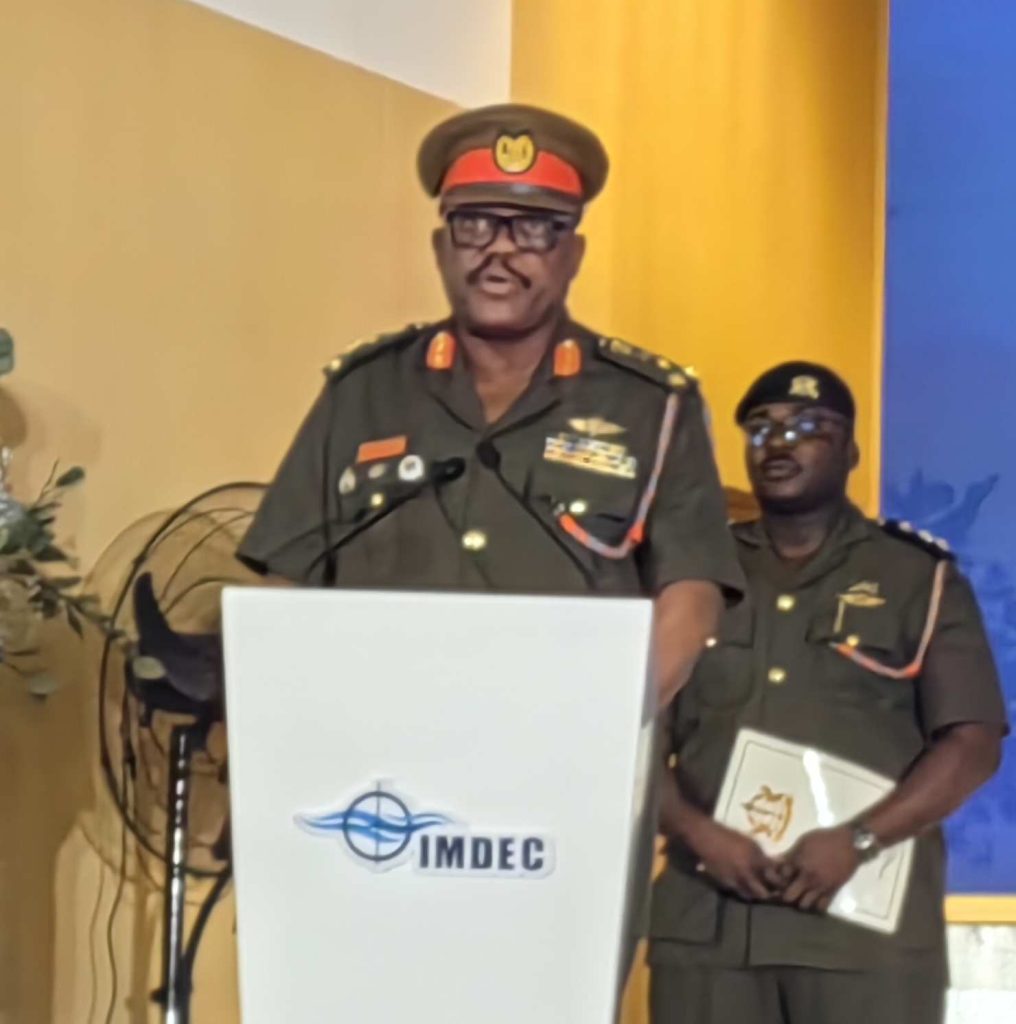
He said recent kidnappings at sea reminds all that no nation is immune from the effects of maritime crimes, and that the threat of piracy and armed robbery remains a sustained threat, as maritime security is not a national concern alone, but a shared regional and global responsibility.
He continued to say that discussions during IMDEC ‘25, particularly on operational, coordination, technological innovation and collaborative frameworks, demonstrates that meaningful steps forward are being taken towards the objective of a safe maritime domain.
He described the conference as being pivotal in the continued development of platforms like the Yaounde Architecture Regional Systems (YARIS), the actualization of the African Union’s Combined Maritime Task Force, and the advancement of joint patrol concepts, as concrete achievements that underscore the collective vision.
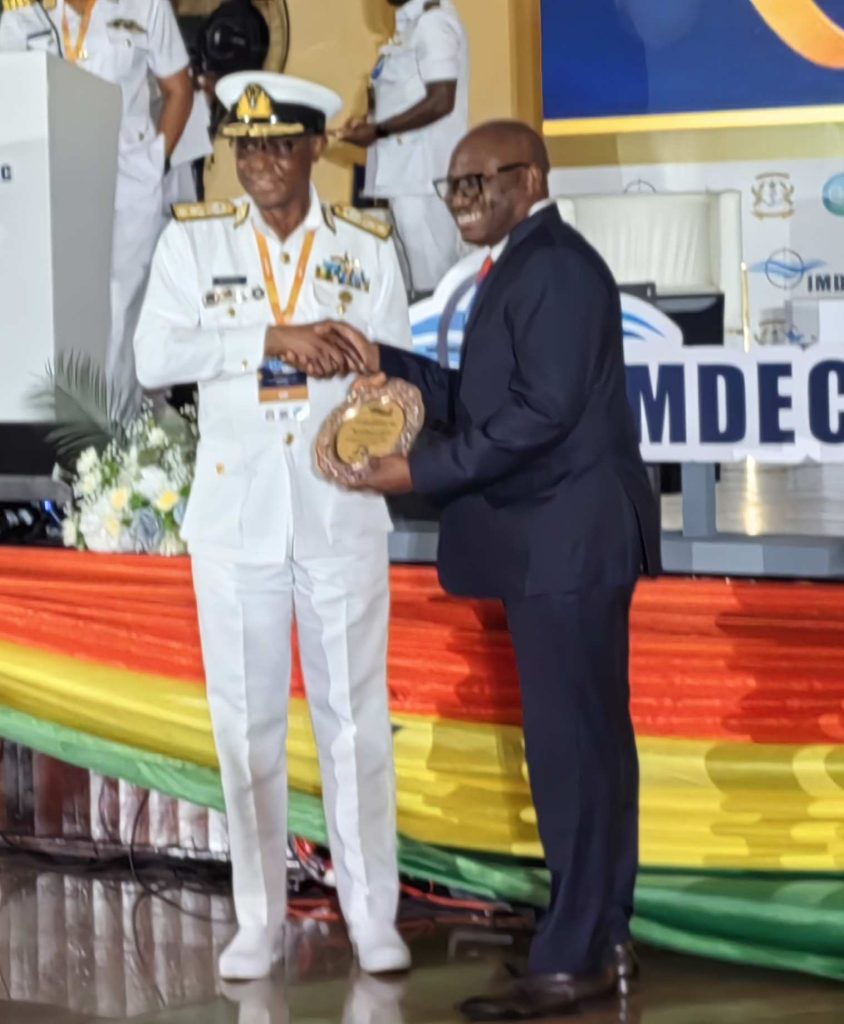
The forum, General Agyapong said, served as a strategic bridge between policy makers, industry leaders, private sector actors and international partners, with the exhibitions showcasing emerging technologies including surveillance platforms, unarmed solutions and digital platforms for domain awareness.
Of the panel sessions, he described them as sparking robust debates and inspiring renewed thinking on securing the GoG through innovation, inclusivity and resilience, further asserting that Africa’s maritime domain holds vast promise, in spite of evolving threats from piracy, illegal fishing, pollution and the shifting contours of global geopolitics.
He praised IMDEC for driving regional maritime cooperation forward by taking positive reflections on the recent African Maritime Policy Summit in Mauritius – which re-emphasized Africa’s resolve to tackle maritime insecurity through stronger coordination, information sharing, and investment in local capacities.
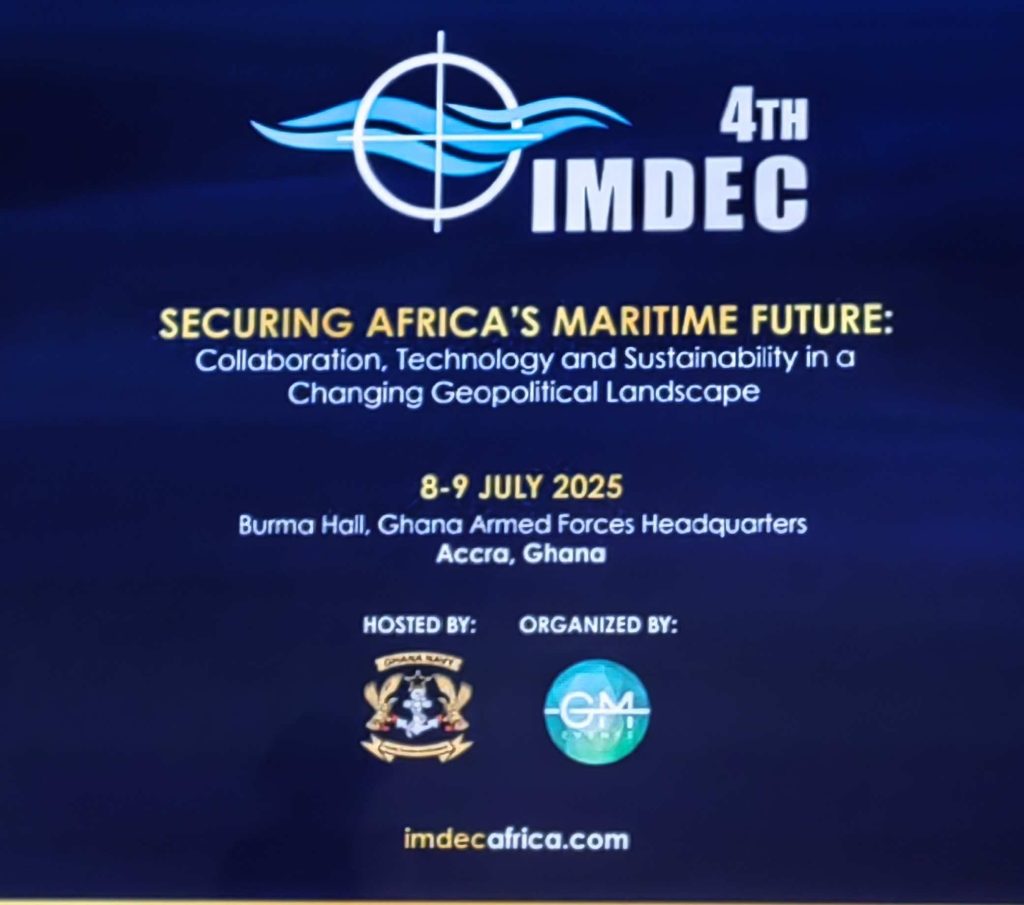
over 200 delegates from 25 countries, including 16 chiefs of units, coast guards and their representatives, security leaders, diplomats and more than 40 defense industry partners, in plenary speeches and panel discussions, bilateral meetings, exhibitions, and social networking.
IMDEC ’25 – KEY OUTCOMES
- The Government of Ghana pledged to continuously support the Yaoundé Code of Conduct and other multilateral frameworks that promote peace, security and prosperity across Africa’s maritime domain.
- The Hon Minister for Fisheries and Aquaculture stressed on the need for an enhanced inter-agency collaboration to ensure that coastal nations maximize the benefits of the Blue Economy.
- Senegal identified geostrategic chokepoints, economic vulnerabilities, piracy, trafficking & irregular migration as the key maritime security challenges.
- Emphasized leveraging the Yaoundé Architecture as a foundation for a wider Atlantic security engagement.
- Mauritania’s approach to Maritime Security and the Blue Economy included:
a. Multi-sectorial strategy linking maritime security to blue economy development.
b. Highlighted IUU fishing, piracy, and climate change as key maritime threats, which could be countered through an integrated naval response using optimized resources.
c. Called for enhanced regional cooperation to boost collective security and drive sustainable maritime prosperity. - Nigeria’s efforts towards combating maritime threats for sustainable blue economy:
a. Prioritized capacity building, interagency synergy, and enhanced regional cooperation to combat maritime threats.
b. Demonstrated progress in surveillance technology, fleet modernization, and operational coordination under the “Trinity of Action” strategy.
c. Called for stronger political support, harmonized legal enforcement, and improved information sharing among the Gulf of Guinea nations. - On securing the future of maritime trade, the Conference:
a. Highlighted the vital role of the commercial maritime sector in driving regional trade and economic integration.
b. Advocated for stronger collaboration between port operators, maritime authorities, academia, and shipping stakeholders.
c. Promoted port digitalization, integrated data-sharing, and secure trade corridors as enablers of resilient maritime commerce. - On Al-powered threat detection and modern technologies in maritime security, the Conference:
a. Highlighted the transformative role of Al in enhancing surveillance, data analytics, and rapid threat detection.
b. Emphasized the importance of interoperable intelligence systems, ethical Al governance and regional tech-driven cooperation.
c. Advocated investment in specialized training and public-private partnerships to strengthen maritime security and governance. - On strategic importance of Naval Maintenance, the Conference:
a. Agreed that there was a need to ensure fleet readiness for defence and security operations.
b. Recognized the need to reduce dependence on expensive overseas maintenance by enhancing local industrial and technical capacity through Public-Private Partnership agreements.
c. Urged to explore the option of remote troubleshooting assistance for quick problem resolution. - On next generation assets and relevance of maritime security in global dynamics, the Conference:
a. Highlighted the need for modular, multi-mission ships flexible for patrols, interdiction and Humanitarian Assistance and Disaster Relief.
b. Emphasized the need for unmanned surface and subsurface vehicles which are low cost and energy efficient.
c. Reaffirmed a comprehensive approach that combines maritime security awareness, maritime security operations and maritime security cooperation to effectively deal with the complex and interconnected nature of modern maritime threats as practiced by the Italian Navy.
d. Stressed that failing to invest in maritime security – sea blindness – is a direct risk to national wealth and sovereignty. - On adopting and sustaining cost-effective advanced naval assets for African nations, the Conference:
a. Advocated modular, cost-efficient platforms and cyber-resilient systems tailored to evolving threats.
b. Raised concerns over the legal ambiguity in private maritime security operations, calling for clear regulatory frameworks.
c. Emphasized civil-military partnerships and regional collaboration to enhance domain awareness and sustain innovation. - On ocean governance, the Conference:
a. Highlighted the importance of the Deep Blue Project, intensified patrols, and integrating surveillance technologies.
b. Emphasized that the root causes of insecurity could be addressed by promoting transparency, good governance, and active community engagement for long-term maritime resilience.
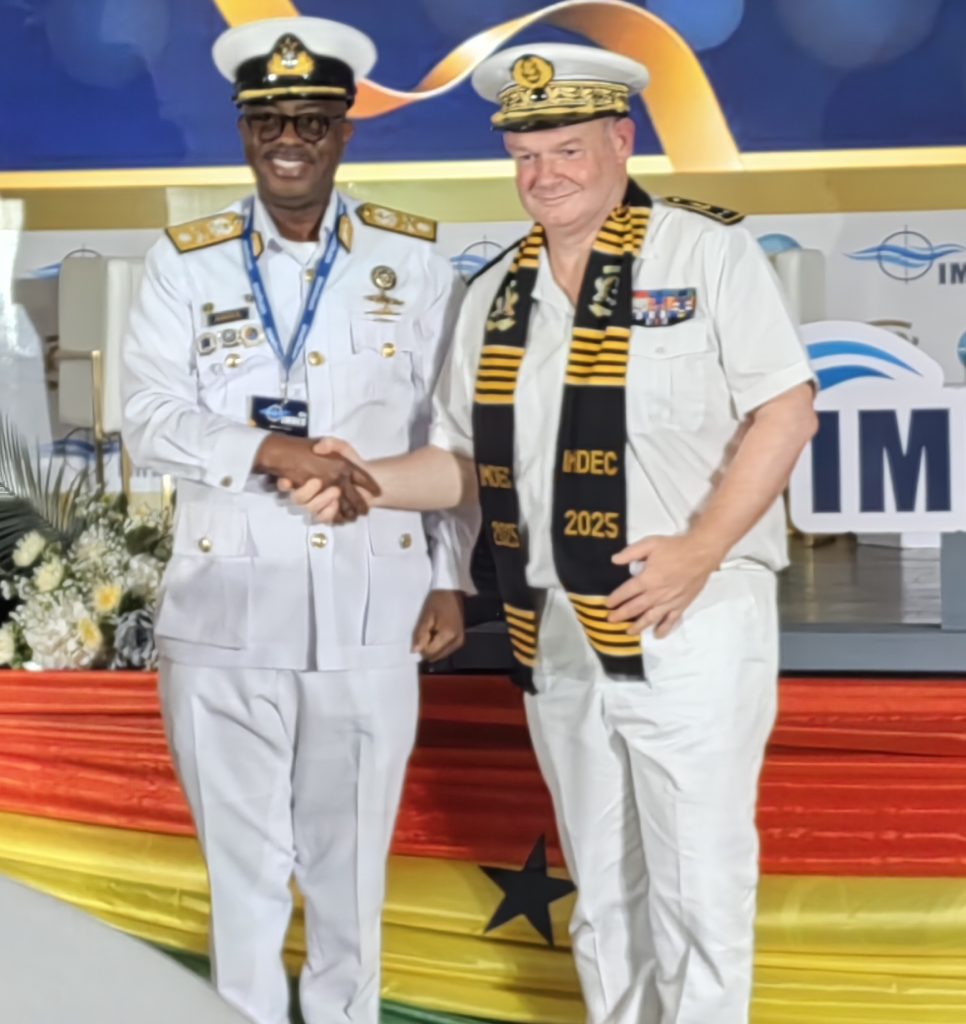
RECOMMENDATIONS
- Stakeholders should explore the establishment of an Atlantic Maritime Fusion Centre (AMFC), linking Yaoundé’s Architecture zones to other maritime command hubs to strengthen cross-regional maritime surveillance and threat response.
- African Navies should prioritize the acquisition of modular, multi-mission and integrated unmanned platforms that are cost effective and energy efficient. This should include investing in affordable missile defence solutions.
- African nations should adopt a comprehensive approach that integrates situational awareness, security operations and international cooperation to effectively tackle evolving maritime threats.
- African coastal states should strengthen bilateral and multilateral partnerships with other navies to develop joint maritime security strategies.
- Stakeholders should integrate a Regional Al Maritime Hub into the Atlantic Maritime Fusion Centre (AMFC) to harmonize threat detection systems, develop shared surveillance databases. Such a hub could drive standardized Al training, foster public-private partnerships to strengthen predictive security, and regional maritime governance.
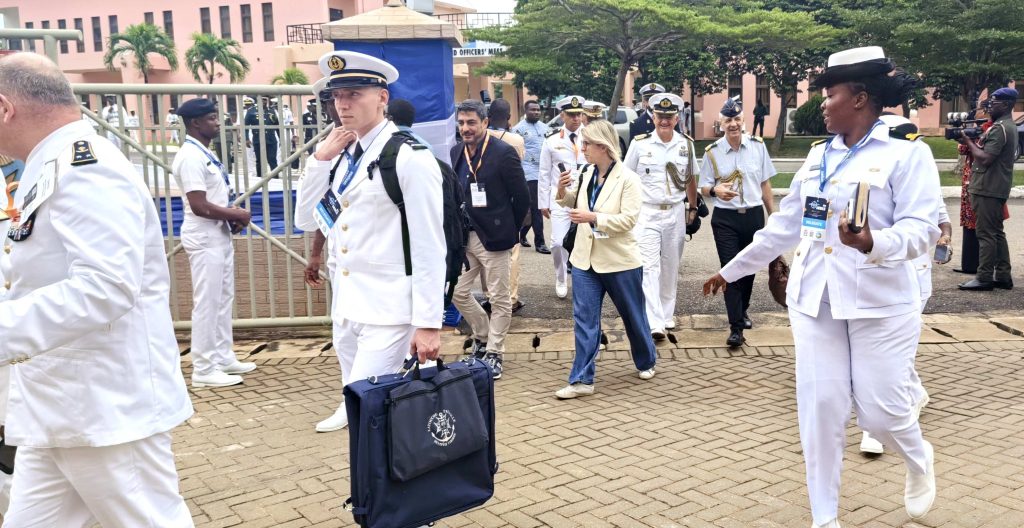
By Kofi Ampeah-Woode
